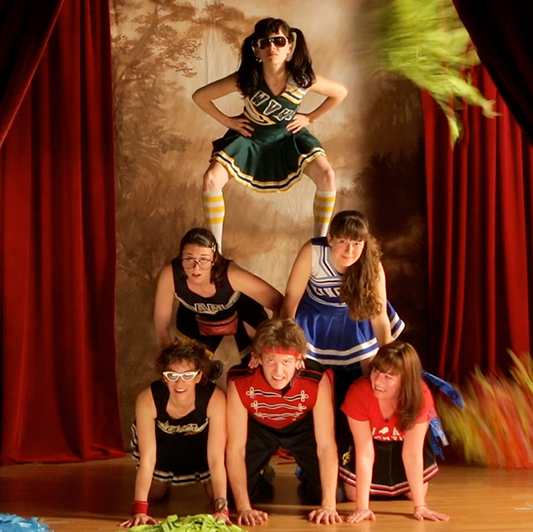
All is fair in love and war...or is it? From romance to spirituality and passion to battle, emotions will run high as we team up with Apostolic Church of God Sanctuary Choir and Mucca Pazza for the Ending of all Endings.
Explore our digital guide for a sneak peak of whats to come.
Explore our digital guide for a sneak peak of whats to come.
GUEST ARTISTS| LISTENING GUIDE |

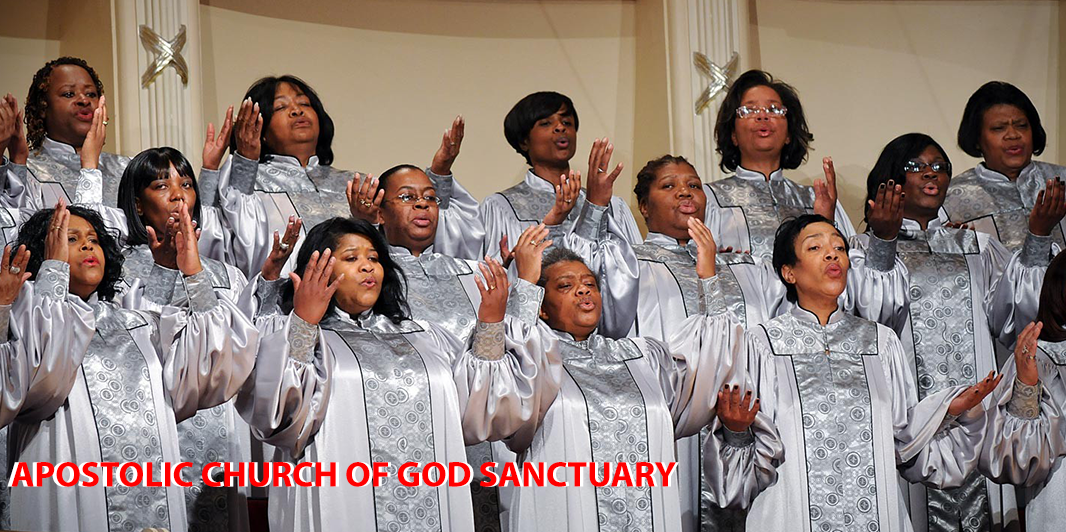
Apostolic Church of God Sanctuary Choir
Long time patrons of the Chicago Sinfonietta know the power of the Apostolic Choir. The first collaboration between the two groups occurred in 1989, and members of the choir participated in Maestro Paul Freeman’s farewell concert. In between are eight more performances spanning over two decades. Maestro Freeman even invited them to Prague to perform with the Czech National Symphony.
The Sanctuary Choir has been an anchor for the music ministry of the Apostolic Church of God throughout the seventy-plus year history of the church. The music focus of the choir is centered on quality presentations of sacred music including anthems, gospel, hymns and inspirational songs. They’ve appeared in concert with everyone from Gladys Knight to Wynton Marsalis. The Choir is currently led by Music Director Chip Johnson and conductor Willetta Greene-Johnson.
Long time patrons of the Chicago Sinfonietta know the power of the Apostolic Choir. The first collaboration between the two groups occurred in 1989, and members of the choir participated in Maestro Paul Freeman’s farewell concert. In between are eight more performances spanning over two decades. Maestro Freeman even invited them to Prague to perform with the Czech National Symphony.
The Sanctuary Choir has been an anchor for the music ministry of the Apostolic Church of God throughout the seventy-plus year history of the church. The music focus of the choir is centered on quality presentations of sacred music including anthems, gospel, hymns and inspirational songs. They’ve appeared in concert with everyone from Gladys Knight to Wynton Marsalis. The Choir is currently led by Music Director Chip Johnson and conductor Willetta Greene-Johnson.
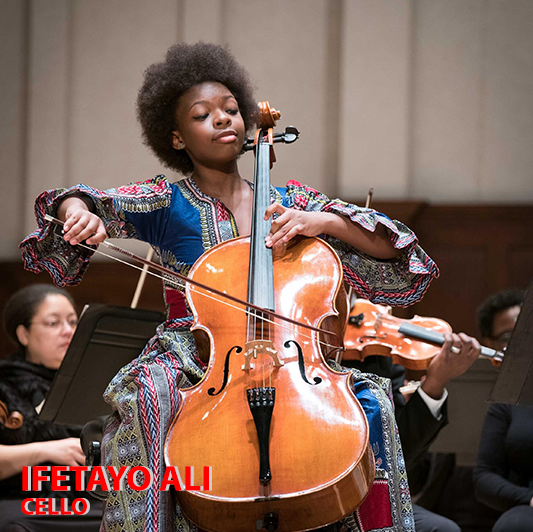
Ifetayo Ali
At the sprightly age of 14 years old, Ifetayo Ali is a well accomplished cellist. She is this year’s Junior Division first place Laureate of the annual Sphinx Competition. At an early age, she began her musical path learning how to play violin. At the age of 3 she decided that she preferred the mellow sounds of the cello and at the age four was able to switch to her preferred instrument. In 2016, she was the winner of the DePaul Concerto Festival for Young Performers competition and had the opportunity to perform as soloist for the Festivals Oistrakh Symphony Orchestra. Over the years, Ifetayo has participated and received honorable mention from many competitions including the Society of American Musicians and The Music Festival in Honor of Confucius. In her spare time, she enjoys singing dancing and playing piano.
At the sprightly age of 14 years old, Ifetayo Ali is a well accomplished cellist. She is this year’s Junior Division first place Laureate of the annual Sphinx Competition. At an early age, she began her musical path learning how to play violin. At the age of 3 she decided that she preferred the mellow sounds of the cello and at the age four was able to switch to her preferred instrument. In 2016, she was the winner of the DePaul Concerto Festival for Young Performers competition and had the opportunity to perform as soloist for the Festivals Oistrakh Symphony Orchestra. Over the years, Ifetayo has participated and received honorable mention from many competitions including the Society of American Musicians and The Music Festival in Honor of Confucius. In her spare time, she enjoys singing dancing and playing piano.
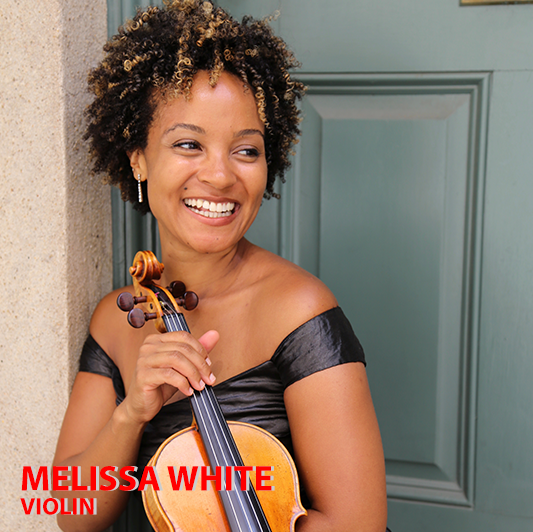
Melissa White
Violinist Melissa White is an American violinist and chamber musician. She has had the pleasure of performing as a soloist for many of America’s leading orchestras such as Cleveland, Detroit, Atlanta, and the Boston Pops. She has also made appearances internationally as a soloist with the Colombian Youth Orchestra, the Philharmonic Dolnoslaska and Baku, Azerbaijan. In 2001, Melissa was the first prize winner of the annual Sphinx competition. She is the founding member of the Harlem Quartet based in New York. The Quartet has performed at the Carnegie Hall, the White House, the Kennedy Center and has performed in Europe, Africa, Japan and the U.K. Melissa has also dabbled in the jazz world and has performed with leading jazz musicians like Chick Corea.
Violinist Melissa White is an American violinist and chamber musician. She has had the pleasure of performing as a soloist for many of America’s leading orchestras such as Cleveland, Detroit, Atlanta, and the Boston Pops. She has also made appearances internationally as a soloist with the Colombian Youth Orchestra, the Philharmonic Dolnoslaska and Baku, Azerbaijan. In 2001, Melissa was the first prize winner of the annual Sphinx competition. She is the founding member of the Harlem Quartet based in New York. The Quartet has performed at the Carnegie Hall, the White House, the Kennedy Center and has performed in Europe, Africa, Japan and the U.K. Melissa has also dabbled in the jazz world and has performed with leading jazz musicians like Chick Corea.
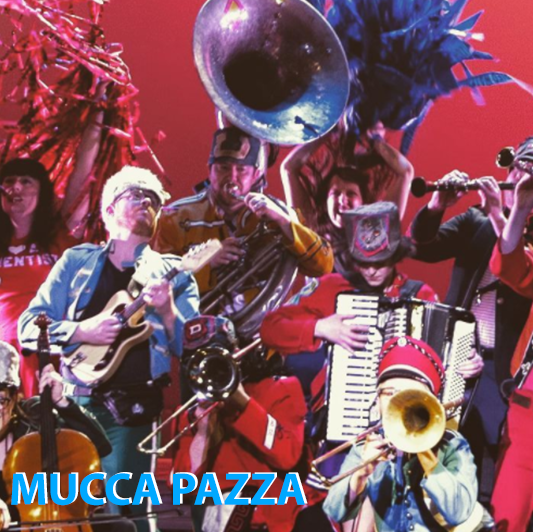
MUCCA PAZZA
Mucca Pazza is an intrepid interdisciplinary instrumental music ensemble from Chicago, IL. Over the last 14 years, they have made a name for themselves playing alarmingly danceable music composed and arranged especially for their implausible instrumentation by band members - original music which defies classification but has bloomed out of manifold influences, from surf to Stravinsky, from Bartok to Zappa, from Esquivel to Ellington. In addition to blaring trumpets, slithering saxophones, clarinets, trombones, and tubas, the band boasts a drumline that seems to share a single nervous system, an entire section of disparate instruments that don’t belong anywhere near a marching band (electric guitars, accordion, violin, and yes, a cello), and contains within its multitudes a cheer squad that performs absurdist cheers and asymmetrical, impressively low-to-the-ground pyramids.
Mucca Pazza is an intrepid interdisciplinary instrumental music ensemble from Chicago, IL. Over the last 14 years, they have made a name for themselves playing alarmingly danceable music composed and arranged especially for their implausible instrumentation by band members - original music which defies classification but has bloomed out of manifold influences, from surf to Stravinsky, from Bartok to Zappa, from Esquivel to Ellington. In addition to blaring trumpets, slithering saxophones, clarinets, trombones, and tubas, the band boasts a drumline that seems to share a single nervous system, an entire section of disparate instruments that don’t belong anywhere near a marching band (electric guitars, accordion, violin, and yes, a cello), and contains within its multitudes a cheer squad that performs absurdist cheers and asymmetrical, impressively low-to-the-ground pyramids.

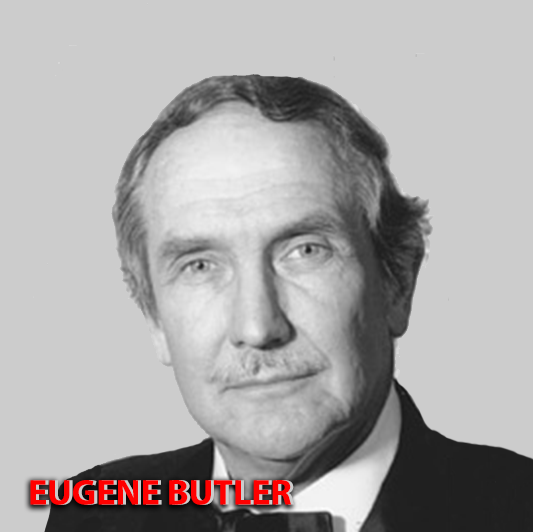
EUGENE BUTLER
Eugene Butler is an American conductor, composer, educator and church musician. As an established musician, he has received numerous honors amongst them being Kansas Composer of the Year and the ASCAP Standard Music Panel Award every year since 1972. He has served as the Director of Choral Activities and Music Theory at Johnson County Community College in Kansas. He has conducted and taught in over 39 states, three Canadian provinces and in England. His recently has received a commission form the National Federation of Music Clubs for his most recent composition A Rhapsody of Praise. Today Eugene has over 700 published compositions. He serves as an adjudicator and workshop leader for seminars, choral and church clinics and new music repertory sessions.
Eugene Butler is an American conductor, composer, educator and church musician. As an established musician, he has received numerous honors amongst them being Kansas Composer of the Year and the ASCAP Standard Music Panel Award every year since 1972. He has served as the Director of Choral Activities and Music Theory at Johnson County Community College in Kansas. He has conducted and taught in over 39 states, three Canadian provinces and in England. His recently has received a commission form the National Federation of Music Clubs for his most recent composition A Rhapsody of Praise. Today Eugene has over 700 published compositions. He serves as an adjudicator and workshop leader for seminars, choral and church clinics and new music repertory sessions.
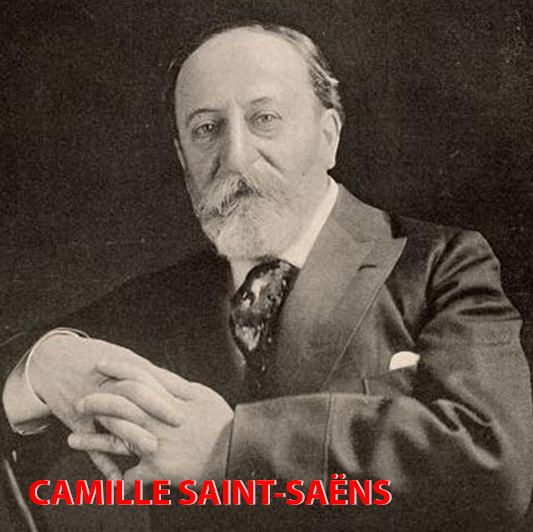
CAMILLE SAINT-SAENS (1835-1921)
Camille Saint Saens was a Parisian composer, pianist and organist. He was a prominent Frenchman during the Romantic era showing fluency in symphonic poems. As a young child, he received piano lessons from his mother that catapulted him into a successful career. During his younger years he attend the Conservatory of Paris where he studied organ and had the opportunity to meet Franz Liszt. He found work as a church organist at Saint Merri and eventually was the organist for La Madeline which was the official church of the French Empire.
Camille Saint Saens was a Parisian composer, pianist and organist. He was a prominent Frenchman during the Romantic era showing fluency in symphonic poems. As a young child, he received piano lessons from his mother that catapulted him into a successful career. During his younger years he attend the Conservatory of Paris where he studied organ and had the opportunity to meet Franz Liszt. He found work as a church organist at Saint Merri and eventually was the organist for La Madeline which was the official church of the French Empire.
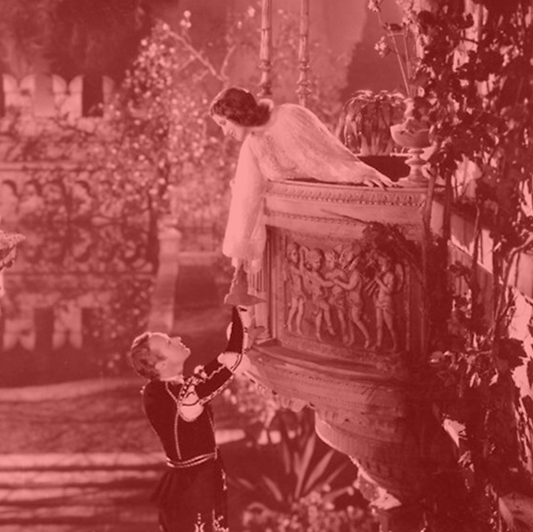
ROMEO & JULIET
Known as the best tragic love story of all time, Prokofiev boldly set out to rewrite the unforgettable ending of Romeo & Juliet by granting the two lovers a happy ending in his ballet score. However, Josef Stalin’s disapproval of the rewrite preserved Shakespeare’s original heart-rending resolution and Prokofiev’s lyrical masterpiece we know today. Prokofiev’s original ending includes a somber funeral theme as Romeo arrives at the tomb, believing Juliet to be dead. He is then, intercepted by Friar Lawrence who explains the effects of the sleeping potion. At this, the magical, tinkling of a glockenspiel heralds the breaking of the spell while Juliet's breathing is played out by slowly pulsing harp and strings. Her awakening is followed by a joyful passage in which the various characters reconcile and give praise for a tragedy averted.
Known as the best tragic love story of all time, Prokofiev boldly set out to rewrite the unforgettable ending of Romeo & Juliet by granting the two lovers a happy ending in his ballet score. However, Josef Stalin’s disapproval of the rewrite preserved Shakespeare’s original heart-rending resolution and Prokofiev’s lyrical masterpiece we know today. Prokofiev’s original ending includes a somber funeral theme as Romeo arrives at the tomb, believing Juliet to be dead. He is then, intercepted by Friar Lawrence who explains the effects of the sleeping potion. At this, the magical, tinkling of a glockenspiel heralds the breaking of the spell while Juliet's breathing is played out by slowly pulsing harp and strings. Her awakening is followed by a joyful passage in which the various characters reconcile and give praise for a tragedy averted.
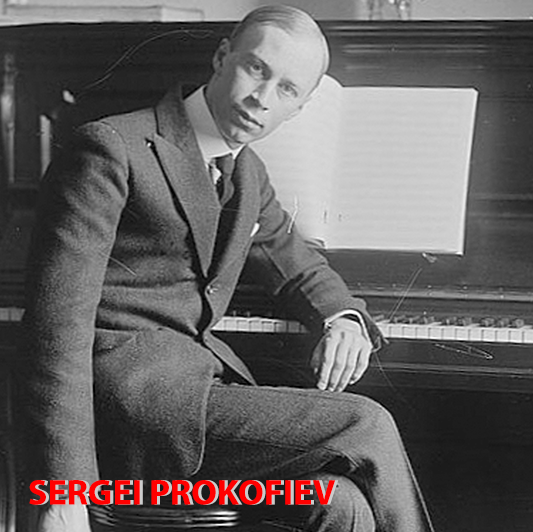
SERGEI PROKOFIEV (1891-1953)
Sergei Prokofiev was a Russian composer whose love of music was fueled by hearing his mother play Beethoven and Chopin. He composed his first piano piece at the age of 5 and his first opera at the age of 9. In 1904 at the age of 13 he went on to study at the Saint Petersburg Conservatory where he was the youngest of his peers. He made a name for himself as a composer and pianist playing difficult repertoire. In the summer of 1917 he composed his first symphony titles the Classical, but it was not until his orchestral piece the Scythian Suite that catered towards his success. He had a devoted love for opera and composed many of them including his most famous one The Love for Three Oranges. During his time, Prokofiev composed many works for the USSR during World War II one of the most significant ones being the opera War and Peace. He is regarded as one of the major composers of the 20th century.
Sergei Prokofiev was a Russian composer whose love of music was fueled by hearing his mother play Beethoven and Chopin. He composed his first piano piece at the age of 5 and his first opera at the age of 9. In 1904 at the age of 13 he went on to study at the Saint Petersburg Conservatory where he was the youngest of his peers. He made a name for himself as a composer and pianist playing difficult repertoire. In the summer of 1917 he composed his first symphony titles the Classical, but it was not until his orchestral piece the Scythian Suite that catered towards his success. He had a devoted love for opera and composed many of them including his most famous one The Love for Three Oranges. During his time, Prokofiev composed many works for the USSR during World War II one of the most significant ones being the opera War and Peace. He is regarded as one of the major composers of the 20th century.
